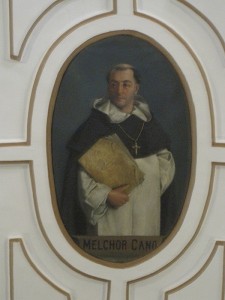One only needs to take a glance at Spanish political history to be aware of the famous debate over the (in)justice of conquest in the New World, which unfolded between the bishop from Chiapas, Las Casas, and his great rival, Juan Ginés de Sepúlveda, at Valladolid in August of 1550. Less known, however, was the intellectual dispute through letters that took place between Sepúlveda and Melchor Cano two years before the great debate at Valladolid. Cano became Prima chair in theology at Salamanca following the death of his teacher, Vitoria, in 1546. He contributed to the Amerindian debate through his De dominio Indorum (1546), and was chosen to participate in the Council of Trent. He organized support for the hungry in the city and he was also Prior at San Esteban.
Cano was in charge of commissioning the University of Salamanca to read and judge Sepúlveda’s Democrates secundus, a treatise justifying the use of force and war to civilize and Christianize the barbarians of the New World using Scriptural, theological, philosophical and juristic authorities. Although Cano was not responsible for the final decision to reject the publication of it due to its heretical doctrine, he certainly supported the decision of the committee.
Only four letters remain of the actual exchange from 1548 to 1549, but that does not rule out the possibility that there could have been more, as has been noted in an excellent article by J.J. Valverde in the journal Florentia Iliberritana (2006). The main topic of the letters regards a dispute over how to interpret St. Paul’s anger toward the Sanhedrin in Acts 23 after being persecuted by them. Sepúlveda employs this passage at the beginning of Democrates to indicate the use of anger and vengeance within the New Testament and even in the life of Christ, who does not abolish the (natural) law, but fulfills it. His larger aim, of course, is to make the case for war against the Amerindians on the basis of punishing and disciplining them to follow the natural law that is immutable and knowable to all.
Having read and opposed the imperialist-humanist doctrine of Sepúlveda’s Democrates, Cano patiently corresponded with him by arguing that even though justified anger is sometimes used in Scripture to denote painful recognition of injustice, it should not be confused with rage and hatred. Cano knows exactly where Sepúlveda is going with his sophistry and wants to cut it off at the root. If the rhetorician can show (as he tried to do in his Democrates primus) that Christian ethics are perfectly consistent with, and even demand, a warrior code, then the possibility of even questioning the conquest is off-limits.
Cano’s main point is that Sepúlveda’s political doctrine is contrary to that of Vitoria, who taught that sins against the natural law could never be a legitimate cause for war. Only deliberate wrongdoing against the innocent, and their defense, could provide such a ground. And this was anything but the case in the Spanish conquests as Vitoria himself knew. Likening theologians to barbarians stuck in their Neoscholastic guild, Sepúlveda replies that they can go on citing Vitoria and Cardinal Cajetan, while he employs the real masters for his aim of missionary-civilizing warfare: Augustine, Ambrose, Gregory, and Aquinas. I wish this were mere rhetoric on Sepúlveda’s part but he makes a very persuasive case in the Democrates secundus for a violent evangelism that does not always equivocate but draws on traditional, Christian political doctrines.
Sepúlveda assures Cano that he has the support of the rest of Spain, even if the theologians are in disagreement. His book was even approved by two people very close to Cano’s master, Vitoria; that is, Francisco’s brother Diego de Vitoria and Dominican Miguel de Arcos, the one whom Vitoria wrote in 1534 when his blood froze at the hearing of Pizarro’s violent spoiling in Peru. Vitoria died never once supporting the actual conquest. Cano sided with his master in this early dispute and had the support of both Salamanca and the university where he first taught in Alcalá.
What is fascinating is that Cano, prior to this exchange, had already written on the Amerindian question and composed his treatise De dominio Indorum as a point by point refutation of Sepúlveda’s thesis (a keen observation by Luciano Pereña). In this concrete case, we can see what the real cost could be in not censoring such a volatile diatribe catering to the conceits of Spanish pride and glory. Sepúlveda finished his debate with Cano, for the moment, by applauding him for the modesty he exercised in his exchange. Such modesty was not received, Sepúlveda noted, by the likes of the bishop from Chiapas. This bishop, none other than Las Casas, would later represent Cano at the Valladolid debate. Sepúlveda complained that his responses were injurious to him and, ironically, more in accord with natural law. I guess there really is something to that saying, “truth hurts.”